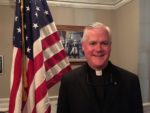Our Fellow Pilgrim
The death of Pope Benedict XVI on December 31, 2022, brought an end to the earthly pilgrimage of this great servant of the servants of God. Joseph Ratzinger’s sacred journey to eternal life began at the baptismal font of his parish church in Marktl, Bavaria, on April 16, 1927 (Holy Saturday), the very day of his birth. I am one thousand percent sure that the priest who administered the saving bath had no idea that this newborn child would one day be elected Pope. Such is Divine Providence at work. That day, as a newly baptized Christian, little Joseph set off on his earthly journey towards heaven. One that would bring him, 95 years later, to the moment when he would utter his final earthly words: “Lord, I love you.” He died on the feast day of a fellow Roman pontiff, Saint Sylvester.
It was my privilege to meet Pope Benedict a few times. Once, my immediate family members and I had the joy of joining a small papal audience at the Vatican. At the conclusion of his remarks, Pope Benedict greeted everyone individually. I presented my mother and father to him, and he received them warmly. My mother was a close friend of Dr. Alice von Hildebrand, a philosophy professor at New York’s Hunter College and the widow of the great German philosopher Dietrich von Hildebrand, an outspoken Catholic critic of Nazi ideology. Von Hildebrand was forced to flee Germany for his life, and ended up teaching for many years at Fordham University. My mother brought greetings from Alice to Pope Benedict. He visibly brightened and responded, “How is she?” That was his manner and style. He was a brilliant theologian, a man who loved to read books and study quietly, but more significantly, he was a true Christian gentleman. He had a deep love and concern for his fellow man.
Pope Benedict’s death brought to mind his beautiful 2010 Letter to Seminarians in which he revealed his paternal heart for those studying to take up the priesthood. His own seminary experience was interrupted by his forced enlistment in the German Army, followed by internment in a United States Army POW camp for a few months at the end of the war. He began his letter reflecting on his introduction to military service:
When in December 1944 I was drafted for military service, the company commander asked each of us what we planned to do in the future. I answered that I wanted to become a Catholic priest. The lieutenant replied: “Then you ought to look for something else. In the new Germany priests are no longer needed.” I knew that this “new Germany” was already coming to an end, and that, after the enormous devastation which that madness had brought upon the country, priests would be needed more than ever.
Benedict continued by encouraging the seminarians (and everyone else) with these magnificent words:
. . . people will always have need of God, even in an age marked by technical mastery of the world and globalization: they will always need the God who has revealed himself in Jesus Christ, the God who gathers us together in the universal Church in order to learn with him and through him life’s true meaning and in order to uphold and apply the standards of true humanity. Where people no longer perceive God, life grows empty; nothing is ever enough. People then seek escape in euphoria and violence; these are the very things that increasingly threaten young people. God is alive. He has created every one of us and he knows us all. He is so great that he has time for the little things in our lives: “Every hair of your head is numbered”. God is alive, and he needs people to serve him and bring him to others. It does make sense to become a priest: the world needs priests, pastors, today, tomorrow and always, until the end of time.
May Pope Benedict XVI rest in God’s eternal peace. How blessed we were to have this fellow pilgrim with us for nearly a century.











Very beautiful. Thanks so much for sharing.
Thank you so much, Father Gerry.
Papa Ratzinger, pray for us.